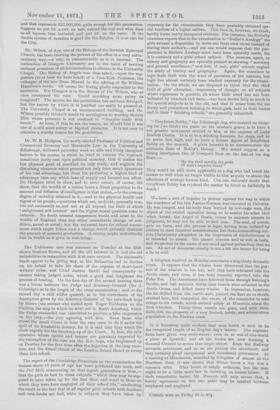The report of the Cambridge Examiners on the examination for
women above 18 years of age has been published this week, and the Pall Mall, commenting on that report, generalizes it thus,— that the girls do best in those subjects "which they may be sup- posed to have taken up for the first time, and worst in those on which they have been employed all their school life," attributing the result to the fact that in all regular girls'-schools both teachers and text-books are bad, while in subjects they have taken up
expressly for the examination they have probably obtained spe- cial teachers of a higher calibre. This view is, however, we think, hardly borne out by the special evidence. For instance, the Divinity examiner reports that in the examination in "Butler's Analogy" the girls evinced a disposition to write out their own views instead of stating their author's,—and yet one would suppose that the pre- paration in Butler's Analogy must have been specially made, for it is certainly not a girls'-school subject. The answers, again, in history and geography are specially praised as showing " accuracy and general excellence ;" now few, if any, girls' schools neglect the study of history and geography. Again, the examiner in logic finds fault with the want of precision of the answers, but logic has almost certainly been studied expressly for the exami- nation. On the whole, we are disposed to think that the chief fault of girls' education,—inaccuracy of thought on all subjects where vagueness is possible, all where their mind has not been ballasted by numbers and facts,—has been shown fully as much in the special subjects as in the old, and that it arises from the too showy and pretentious training to which girls, both in their homes and in their " finishing schools," are generally submitted.


































 Previous page
Previous page